
Title: Degrowth: Less Resource Use for More Wellbeing and Resilience
While the United Nations Sustainable Development Goals direct all countries to reduce environmental impacts, governments and businesses continue to promise and prioritize economic growth. Degrowth theory draws on the science of thermodynamics to illuminate systemic impacts of this growth: societal metabolisms transform material and energy into goods and services in processes that convert low entropy stocks of resources into high entropy waste. As accelerating metabolisms lead to more and more anthropogenic entropy, with outcomes ranging from imbalanced nutrient and hydrological cycles to climate break-down, a growing network of scholars and activists work toward degrowth objectives: to reduce global energy and resource use, curb obsessions with growth, and reorient societies around equitable wellbeing and resilience.
Broad consensus that the survival of human societies depends on reducing harmful environmental impacts would suggest widespread movement toward degrowth objectives, yet resistance is fueled by fear of slowing economic growth, perceived as necessary to sustain current political-economic systems. But degrowth objectives are not achieved by ruining economies; on the contrary, degrowth proposals strive to prevent recessions and austerity measures, seen as unwanted consequences of growth-driven politics (Hickel 2020). Neither does degrowth aim to increase economic activity; above surprisingly low thresholds, higher Gross Domestic Products (GDPs) fail to correlate with indicators of a population’s wellbeing, such as physical and mental health, infant mortality, incarceration, measures of equity and mobility, or maintenance of ecofootprints within a fair share of planetary boundaries. Like Nobel-winning economists Joseph Stiglitz and Amartya Sen, degrowth scholars do not see the GDP as a measure of well-being or sustainability.
It is vital here to distinguish GDP growth, defined as the increasing monetary value of goods and services exchanged in a given market, from material growth, defined as the increasing quantity of matter and energy transformed by human societies, calculated with measures like material flows analyses and ecological footprints. While close historical connections between GDP and material growth are undeniable, their future relations are hotly debated. Advocates for green growth hypothesize that technological innovation will make possible “decoupling,” an imagined path on which increasing GDPs coexist with decreasing material use and waste. Although reviews of scientific studies do identify countries that have reduced CO2 emissions without halting GDP growth, they find no evidence that economy-wide resource use and waste have been decoupled from GDP on national or international scales (Parrique T. et al. 2019; Vadén et al. 2020). Moves toward decoupling are necessary but, without deeper societal changes, insufficient. Efforts to predict or influence relations between material and monetary flows are further complicated by trends including the financialization of commodity markets, changing fiscal policies, and innovative currency systems. Good news is that these debates need not constrain movement: instead of pursuing GDP growth as a proxy for everything good, degrowth urges societies to work directly toward desired outcomes.
Less Material Transformed, Less Entropy
Let us start with the most tangible degrowth objective: reduce quantities of material and energy transformed by human economies: coal burned, minerals mined, plants and animals harvested. Since Nicholas Georgescu-Roegen and Herman Daly connected economics with thermodynamics, hundreds of degrowth-aligned scientific articles have analyzed biophysical interactions among socio-economic systems, ecosystems, and earth systems (reviewed in Gomiero 2017, Kallis et al. 2018, Kershner et al. 2015, Weiss and Cattaneo 2017). They ask: How have ecofootprints increased with GDP? How do materials, energy, and capital flow across value chains in ways that increase profits in some places while increasing entropy in others? How do these historical trends correlate with breaches of planetary boundaries? What policies and technologies help to reduce material throughput? Facing biodiversity collapse, deforestation, ocean acidification, and related phenomena, scientists around the world join degrowth advocates in urging wealthy societies to slow down (Ripple et al. 2020; Steffen et al. 2015; Rockström et al. 2009).
In international relations, commitment to the first degrowth objective is advanced in the UN Framework Convention on Climate Change, articulated in the Kyoto Protocol and Paris Agreement, which seek to reduce global emissions while recognizing shared but differentiated responsibilities. While the global North is responsible for ninety-two percent of the CO2 emissions that exceed safe planetary boundaries, southern populations suffer loss of life and livelihood to climate change (Hickel 2020). The Intergovernmental Panel on Climate Change (2018) responds to these uneven realities by advising high-income countries to slow their pace of production and consumption. In overall resource use, a similarly uneven distribution of benefits and burdens leads degrowth advocates to urge decreased consumption among those who exceed their share of planetary resources, with increased consumption among the world’s poorest. Healthier balance within economies is encouraged by cutting investments in ecologically damaging ventures while increasing support for health, education, and environment.
Curbing Obsessions with Growth
The second objective, curbing cultural and personal obsessions with growth, involves adjusting practices, relationships, myths, and values, as well as social and political organizations. In many contexts, personal identities are shaped by expectations that each generation will display bigger houses, more cars, grander holidays than their parents, and by messages that a successful citizen, employee, or spouse is measured by levels of production and consumption. Ideologies of growth also justify international relations that exploit and degrade others, including spatial fixes through which leading economies obtain resources from less powerful countries and deposit waste in their territories, as well temporal fixes that push costs and consequences of growth onto future generations.
Since its earliest articulations, decroissance/degrowth diverged from mainstream international development by insisting that wealthy societies examine their own ambitions and put their own houses in order before intervening to fix the rest of the world, on whose backs they grew (Gorz 1980, Illich 1974, and LaTouche 1986). Today, degrowth scholars criticize trickle-down and charity discourses that make it seem as if the growth of wealthy economies helps the global South, and instead urge high-income countries to focus on repaying ecological debts and reversing unequal flows of capital, resources, and waste.
Amid global dependencies, many governments and households welcome access to income from international corporations who locate agribusinesses, sweatshops, electronic waste, or other ventures in their territories. At the same time, the 3,500 conflicts documented to date in the Environmental Justice Atlas demonstrate that many people living with very low incomes organize to resist initiatives for economic development, including mines, dams, oil-wells, ranches, factories, plantations, and highways. There is much to learn from groups struggling to sustain old and to forge new paths away from growth, including deep traditions in India (Ecological Swaraj) and South Africa (Ubuntu), and millennial Christian traditions of simple communal life, revitalized in contexts ranging from North American spiritual communities to Latin American responses to Pope Francis’ On Care for our Common Home.
Building Equitable and Resilient Societies
Degrowth’s third objective—reorienting societies around equitable wellbeing and resilience—is increasingly prioritized by some nation-states. Bhutan’s policies for Gross National Happiness have for decades supported fulfillment in harmony with Buddhist spiritual traditions, while eco-social worldviews known as Buen Vivir have been incorporated into policies, programs, even national constitutions in Bolivia and Ecuador. Participants in the Wellbeing Economy Governments network, including leaders of Finland, Iceland, New Zealand, Scotland, and Wales, have pledged to prioritize wellbeing in future policies.
Amid the COVID-19 pandemic, governments are experimenting with policies proposed in the 2020 book The Case for Degrowth: Green New Deals, basic care incomes, reduced labor hours, public services, and support for community economies. Countries including Hong Kong, Japan, Slovenia, Spain, and the United States have instituted provisional cash payments to sustain residents through the crisis. Companies and governments have reduced working hours, implemented work-sharing, and subsidized workers during quarantine and business closings. Mechanisms including the US Defense Production Act have been mobilized to secure vital supplies and services. In moves to “build back better,” the transformative potential of these policies depends on the degree to which they are institutionalized as support for wellbeing and resilience of human and natural resources, rather than as stimuli for economic growth. The Case for Degrowth identifies opportunities to fund supportive programs by reorienting subsidies away from what jeopardizes wellbeing and resilience (e.g., fossil fuels, pollution-emitting enterprises, extreme wealth and income, natural resource use).
Without international coordination and enforcement, of course, such policies could provoke trade imbalances, capital flight, and other disequilibria. Local and national transitions toward sustainable states depend on strengthening existing mechanisms of international governance and establishing new ones, like the global minimum corporate tax rate supported by US Treasury Secretary Janet Yellen, and the global universal basic wage proposed by Pope Francis. In international relations, degrowth objectives are generating tension within mainstream pushes for green growth, and gaining prominence in parallel forums such as Green New Deal for Europe, the EU Parliament’s Post-Growth Conference, Latin America’s Pacto Ecosocial del Sur, and the African Green Stimulus Programme.
Competition and collaboration that prioritizes growth as means toward higher standards of living and geopolitical power have contributed to destruction of ecosystems and lifeways around the world. It is time for a gentler turn toward arrangements that sustain equitable wellbeing.
. . .
Susan Paulson is Professor at the University of Florida’s Center for Latin American Studies, teaching about political ecology and about gender, masculinities and environment. She researched and taught about human-environment relations during 15 years in Latin America, and taught sustainability studies during 5 years in Europe. Paulson’s commitment to engaging wide audiences is manifest in publications in 12 countries and 4 languages (plus translations), and via invited lectures around the world.
Contributor Kaden Paulson-Smith is a Ph.D. Candidate in the Department of Political Science at the University of Wisconsin—Madison. Their research contributes to critical carceral studies and gender and sexuality studies, with a focus on critiquing colonial legacies of state control.
Image Credit: United Nations Photo (via Creative Commons)
Recommended Articles

This article contends that South Africa’s 2025 G20 presidency presents a critical opening to shape governance of critical mineral supply chains, essential for renewable energy, digital economies, and national…

Germany’s economy is being throttled by a more competitive China that has usurped its previous manufacturing dominance in many industries. In response, Germany has doubled down on the China bet…

In 2021, the European Union (EU) attempted to assert itself in the Indo-Pacific arena to increase its geopolitical relevance by releasing an ambitious and multifaceted Indo-Pacific Strategy. However, findings from…